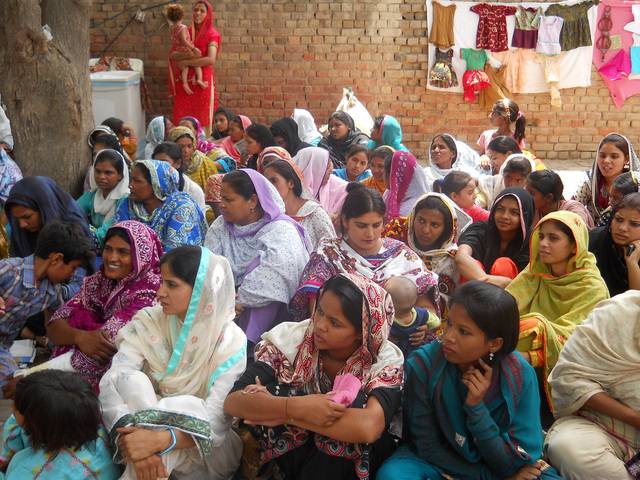Because its 2015”, replied the new Canadian Prime Minister Justin Trudeau upon being questioned regarding his choice of gender balance characterising his cabinet; half of which are women.
Certainly the presence of women in positions of power is not entirely an accurate indicator of the general status of women in a country; case in point being Pakistan itself where the late Benazir Bhutto was twice elected premier and yet it has remained a country, which assessed by the World Economic Forum on levels of economic participation and opportunity; educational attainment, health and survival, and political empowerment, was ranked 141 out of 142 countries on the Gender Gap Index of 2014.
Yet Trudeau’s reply does strike as an important message: female representation, participation; gender balance and equality in this day and age should be the norm and not the exception.
On the other hand, the chief of Jamaat-e-Islami recently addressed the women training convention at Mansoora. And while he commendably spoke against the tradition of dowry in Pakistan, and advocated the availability of interest free loans for women wishing to engage in small businesses and welfare programmes for them, he also opined that, “Almighty Allah had made women the queen of the household whereas all those engaged in the so-called struggle for women’s rights had compelled the respectable mothers, sisters and daughters to work round the clock.” Siraj-ul-Haq’s assertion was not only a reflection of the concept that females inherently belong to the domestic domain but also a reminder of its continued prevalence in Pakistan today; legitimised using religion and the cultural ideals of honour, decency and modesty, but also glorified now as some sort of royal privilege possessed by the chaar diwari.
Islam and its relationship with women is another debate but that this is the same religion whose Umm-el-Momineen included Hazrat Khadija, a most successful businesswoman, and Hazrat Ayesha, whose intellect and role in spreading the religion’s message is well-known and recorded, and who also led a war, is an aspect that must not be let out of sight.
But notwithstanding the absurdity of associating NGOs with it, Siraj-ul-Haq’s statement on the ‘injustice’ of forcing women to work is preposterous in itself when the ‘queens’ he speaks of are ‘bound’ to do countless duties and work endlessly round the clock, years on end, in their ‘kingdoms’ without any respite. Commentator and columnist Gul Bukhari retorted to the JI Chief’s statement by tweeting: “Someone tell him it’s desire, necessity, poverty, ambition etc. Bring me one woman compelled to work by activists.”
Indeed the notion that women in Pakistan are ‘compelled’ by NGOs to work posits that no woman would want to work unless pressured by some nefarious forces (such as NGOs, of course), and would be content with belonging to the domestic area with the primary responsibility of producing and raising children, taking care of husband and home. Such a huge judgment flattens the reality, as articulated by Gul Bukhari, that women may, can and do work professionally out of difficulty of circumstances or their personal aspirations.
Since the confinement of women to the household, or their ascension to queen-hood, essentially makes them the ‘invisible’ gender; this concept extends onto the expectation that women remain obscure and hidden; never too prominent in any way – physically or by way of their voices. The exercise of any female agency or choice is then a violation of this designated physical and ideational boundary, often set in traditional values of honour and modesty. And it is this violation that comes to frequently factor in the gruesome incidences of honour killings which take the lives of 1000 women annually in Pakistan. Thus, in a country where such boundaries remain demarcated for many and continue to be advocated, female appearance in public spaces will often appear to be cultural aberrations.
Moreover, the prevalence of female confinement to the domestic as a natural and necessary order for women to adhere to in our society has led to a scandalization of female presence and participation in public spaces. The ugly phenomenon reared its head notoriously during the infamous dharna held by Imran Khan last year.
However, more alarmingly, this scandalization is a part of the wider problem women here face regarding public spaces and places; culturally set as alien territories for them, with the right to their occupation understood as a monopoly for males since public spaces belong to ‘their sphere’ – everything external and separate from the domestic domain to which women ‘belong’. Any breach of this monopoly by women is then either fraught with risks such as those of harassment, or restrained by these risks which limit female mobility and safety, but are rationalized as part-and-parcel of stepping into the ‘male realm’ of public spaces; in which female presence and visibility may be treated as cultural anomalies.
That this scandalization is a potent problem can be seen from the recent beating of female students at KU for playing cricket. It is perhaps infuriating and unfortunate incidents like these which chain significance to campaigns such as “Girls at Dhabas”; projects which aim to resist this scandalization and tacit exclusion of women from public spaces and places, which may not be systematically or legally enforced but are imposed culturally and socially, by attempting to reclaim traditionally male spaces and activities through normalization of female presence and engagement with them.
It is crucial to note that for any political, social or economic progress to be made in Pakistan, women are but an indispensable force. But such a realization necessitates a reconfiguration of cultural imagination which doesn’t confine or limit but accepts, accommodates and creates space for female roles, presence, representation and participation in all walks of national life.






